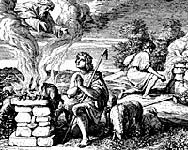Dear readers,
 |
|
“Serving time”.
I always have been struck by this short but telling expression. It means
the fact of passing one's time in jail, so as to pay a debt towards
society. Waitresses are serving meals, and prisoners are “serving
time”. They are forced to give their time away, in a place and
a manner, not of their choosing, nor liking. They deserve it. It cannot
repair the damage they have done to society and individuals, but this
giving away of their time is accepted by society as a way to satisfy
the demands of Justice, which was encroached upon by their bad actions.
Some of them even receive a sentence that has a hint of eternity: They
are condemned to serve between a hundred to a thousand years in jail.
This is because society tries to reflect, in the judiciary sentence,
the gravity of the offence committed. That is why the bad guys who have
done worse things are those who try the most to evade Justice; they
are the ones who have the most to lose. So they run away and hide, because
they don't want to “serve time”. That shows how much important
time is for people. That may show us also how much it is valued by God
as well. Let me explain a little further...
I will make for
this purpose a short analysis of a magnificent prayer of the Holy Mass.
I refer to the second one after the Consecration of the Precious Blood.
It starts with the words: “Supra quae propitio ac sereno vultu respicere
digneris...” This prayer says: “Deign, O Lord, to look down
on these (offerings) with a propitious and serene Face, as You deigned
to accept the gifts of your just child Abel, and the sacrifice of our
patriarch Abraham, and the one that Your High Priest Melchisedech brought
to You: a Holy Sacrifice, an Immaculate Host.” What we may ask
ourselves upon reading this prayer is: 1) Why does the Church mention
together these three different types of sacrifices made to God in the
Old Testament? 2) What do they have in common? 3) Why are they different?
4) What can we learn about ourselves in that prayer?
Please indulge
my trying to answer these questions for you:
1)
The Church tries to render Almighty God propitious to our offering
by reminding Him of three sacrifices that pleased Him in the past.
She does so in respect to the Trinitarian character of God: Father,
Son, Holy Ghost.
| |
 |
| |
Abel's
Sacrifice |
2)
These sacrifices all have in common
the fact that they were really good sacrifices. This was because the
offerers were sacrificing something so dear to them that is was like
taking part of their whole heart and giving it to God. They understood
they were just giving something back to God. These are the reasons why
the sacrifice of Abel was accepted by God, but not that of Cain. Indeed,
Abel, who was a shepherd, separated himself, for the love of God, from
the firstlings of his sheep. Now, those who know a little bit about
being a shepherd will understand this was no small sacrifice. For Abel,
these lambs were the first ones of his flock; they must have been like
pets to him. Yet, when time has come to worship God, Abel wasn't stingy.
To show his love for his Maker, he gave Him what his heart loved and
was attached to: the firstlings of his flock. In the case of Abraham,
it is again an act of pure love: He accepted to sacrifice his only begotten
son Isaac, because God told him to. He was going to pierce the side
of his beloved son; the son of the miracle (Sarah was sterile, remember)!
Despite his tremendous love for Isaac, he was determined to give back
to God what God had given him: A son to whom his heart was deeply attached.
Abraham was giving his heart to God. As for Melchisedech, he didn't
offer God bloody sacrifices, but a spiritual one, represented by that
of bread and wine. These two represent the most vital and basic means
of sustaining one's life: Food and drink. Melchisedech's sacrifice therefore
was that to which everybody is most attached, what we have most at heart:
Our own life. It was a spiritual sacrifice, a total consecration of
his soul to God. So these three sacrifices pleased God because in every
one of them, the offerer was giving away what he loved dearly. They
were all sacrificing their hearts. All these sacrifices were also figures
of the Sacrifice of Our Lord: Lamb of God (...Abel); Only begotten Son,
and Son of the Miracle (...Abraham); Sacrifice of His life that He perpetuates
till the end of time at Mass (... Melchisedech).
3)
But these three offerings are also different: Although
they all concern the heart, and they are all sacrifices of what is dearly
loved, there is a clear progression from the first one to the last:
Firstlings (Abel); Only begotten son (Abraham); Oneself Melchisedech).
 |
|
Abraham's
Sacrifice of Isaac |
|
4)
Now we know what this beautiful prayer teaches us.
We know that the sacrifice that pleases God is when we detach ourselves
from what we love. To do that for the love of God is like to give Him
our hearts. But there are degrees in these acts of love of God. We can
detach from things, or persons, or self. Obviously the most perfect
is this third form of sacrifice, akin to that of Melchisedech, and to
that of Our Lord on the Cross, at Mass, and in the Tabernacle.
One fact we often
do not realize is that Our Lord in the Blessed Sacrament offers Himself
up to God without ceasing. There He appeases the Almighty by offering
His pierced Heart for the salvation of sinners. It is the most perfect
sacrifice. It shows us the way to please God: To sacrifice ourselves
for His love and for the conversion of the lost sheep.
So when we start
to meditate on the Sacrifice of Our Lord, we discover that He is “serving
time”. He is, indeed, the Prisoner of the Tabernacle. He is, so
to speak, giving His time away, in a place and in a manner not of His
own choosing: The catholic priest is the one who decides when
he will consecrate the bread and the wine, and where he will
keep the sacred hosts. It is only up to him that this place will be
fitting or not. Again, the priest is the one who takes Our Lord in and
out of His cell of Love, and who gives Him to the people. Our Lord does
not resist. He is chained by bonds of Charity. He will continue this
Sacrifice, He will “serve time”, until there is no time left:
Until the end of the world, when the number of the elects will be fulfilled.
Now we understand
that in order to please God, we must do like Our Lord, and give Him
not only things or people, but rather give what we have most at heart:
Ourselves. How can we do that? The answer is very simple. We have
to give our time to God. It is not enough to sacrifice things, to
give up sweets, smoking, toys, pets... Or to leave people in order to
better serve God. All of this pleases God for sure, but we can do better.
We can give away the only thing we cling to so desperately; that which
is the most difficult to separate from: Our free time!
| |
 |
| |
Melchisedech's
Sacrifice of Bread and Wine |
Already I can feel
your hearts bleed, and I can hear howls of pain! Time! To give away
our precious time! What a martyrdom, what a sacrifice! Precisely. That
is the offering, which is most pleasing to God! Because, in practice,
that is the most heartbreaking thing to do! You doubt it? Well, look
around you, look at yourself, look even to the consecrated souls. What
is most difficult for everyone? To give our free time to God. So much
so that we can say that the more people give of their free time to God,
the more advanced they are in perfection. Think about it: Time is
the only thing we have when we have lost everything else. So let
us not do like the bad guys, who try to escape the justice of man, because
they don't want to “serve time”. Let us instead go to the church,
and visit Our Lord who is a Prisoner in the Tabernacle! Let us remember
that He is “serving time”, so as to enable us to satisfy the
Justice of God for our sins. Let us take from our beloved time to read
the Word of God, and to meditate on His sacred Revelation! Let us sacrifice
some part of our recreations to elevate our hearts towards our beloved
Father by a fervent prayer! Finally, let us also consider that if we
try to run away from sacrificing our time, we greatly risk to become
prisoners of Hell, thus suffering in a place and in a manner not of
our choosing. A place where the sacrificing of self would not be possible
anymore because, among other things, we would be in the dimension of
eternity, where time is no more available.
I
Pray God to bless you all and gives
you
the Grace of a Happy and Holy
Easter
time!
NOTA
BENE:
With the blessing
of our District Superior, we have decided to change the name of our
magazine. The reason is that most readers don't have a clue what “Communicantes”
means. And I don't blame them, because it is in Latin and it sounds
strange and all that. Now, it is even worse when I try to talk about
the magazine outside the traditionalist circles. So I ask you all to
rack your brains, and to give me some suggestions. But I have a few
specific guidelines you must follow: